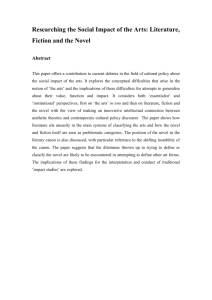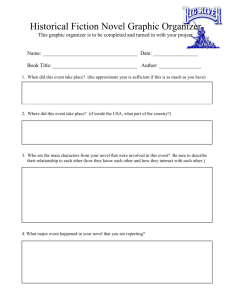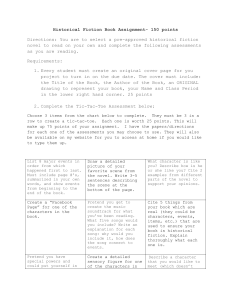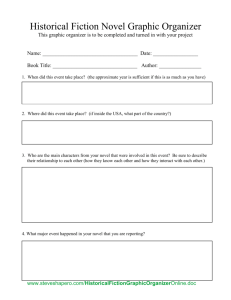walt whitman high school summer reading list for grade 12 2014-2015
advertisement
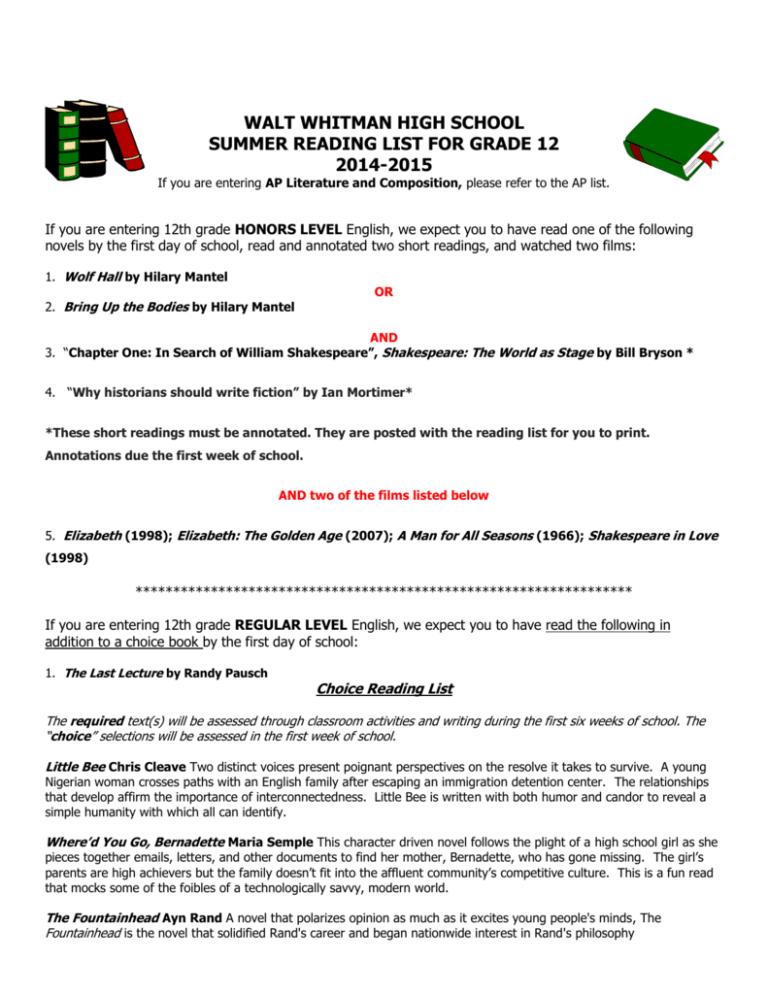
WALT WHITMAN HIGH SCHOOL SUMMER READING LIST FOR GRADE 12 2014-2015 If you are entering AP Literature and Composition, please refer to the AP list. If you are entering 12th grade HONORS LEVEL English, we expect you to have read one of the following novels by the first day of school, read and annotated two short readings, and watched two films: 1. Wolf Hall by Hilary Mantel 2. Bring Up the Bodies by Hilary Mantel OR AND 3. “Chapter One: In Search of William Shakespeare”, Shakespeare: The World as Stage by Bill Bryson * 4. “Why historians should write fiction” by Ian Mortimer* *These short readings must be annotated. They are posted with the reading list for you to print. Annotations due the first week of school. AND two of the films listed below 5. Elizabeth (1998); Elizabeth: The Golden Age (2007); A Man for All Seasons (1966); Shakespeare in Love (1998) ****************************************************************** If you are entering 12th grade REGULAR LEVEL English, we expect you to have read the following in addition to a choice book by the first day of school: 1. The Last Lecture by Randy Pausch Choice Reading List The required text(s) will be assessed through classroom activities and writing during the first six weeks of school. The “choice” selections will be assessed in the first week of school. Little Bee Chris Cleave Two distinct voices present poignant perspectives on the resolve it takes to survive. A young Nigerian woman crosses paths with an English family after escaping an immigration detention center. The relationships that develop affirm the importance of interconnectedness. Little Bee is written with both humor and candor to reveal a simple humanity with which all can identify. Where’d You Go, Bernadette Maria Semple This character driven novel follows the plight of a high school girl as she pieces together emails, letters, and other documents to find her mother, Bernadette, who has gone missing. The girl’s parents are high achievers but the family doesn’t fit into the affluent community’s competitive culture. This is a fun read that mocks some of the foibles of a technologically savvy, modern world. The Fountainhead Ayn Rand A novel that polarizes opinion as much as it excites young people's minds, The Fountainhead is the novel that solidified Rand's career and began nationwide interest in Rand's philosophy "objectivism/rational egoism." This is the story of Howard Roark, an architect who will not compromise: a man who builds for himself – not for economic and social utility. Part social criticism, part philosophy, and part love story, this novel is hard to classify as well as hard to forget. Invisible Man Ralph Ellison Acclaimed as a powerful representation of the lives of African Americans during the Depression, this novel describes the experiences of one young black man during that period. After a Harlem race riot, he is aware that he must contend with both whites and blacks and that loss of social identity makes him invisible among his fellow beings. Killer Angels Michael Shaara Winner of the Pulitzer Prize for Fiction, this compelling story focuses on the four riveting days in June and July, 1863, preceding the Battle of Gettysburg. Told from the perspective of the colonels, generals, and military men who fought and died in this epic struggle, this novel was the basis of the film Gettysburg. Life of Pi Yann Martel Yann Martel's imaginative and unforgettable Life of Pi concerns sixteen-year-old Pi Patel, the son of a zookeeper, who finds himself adrift in the Pacific Ocean, trapped on a 26-foot lifeboat with a wounded zebra, a spotted hyena, a seasick orangutan, and a 450-pound Bengal tiger name Richard Parker. The Kite Runner Khaled Hosseini This epic tale takes the reader from the final days of Afghanistan's monarchy to the atrocities of the Taliban. It tells the story of a father – son relationship, of a friendship between two boys, and of the guilt that takes one of them back to his homeland to make restitution for his sins. In the words of Isabelle Allende: "It is so powerful that for a long time everything I read after seemed bland." No Exit Jean-Paul Sartre Three strangers find themselves in a hotel room decorated with Second Empire furniture. Gradually they learn about one another as they discuss their current situation and their respective pasts. In the final analysis they come to a chilling conclusion: "Hell is – other people." The first play to be performed in Paris after its liberation from Nazi occupation, No Exit represents an influential landmark in Existentialist thought and a pioneering example of the dramatic genre known as Theater of the Absurd. On the Road Jack Kerouac This semi-autobiographical novel describes the wanderings across America, casual friendships, labors, and affairs of Sal Paradise, a young writer, and his friend and hero, Dean Moriarty. Slaughterhouse-Five Kurt Vonnegut Arguably Vonnegut's most celebrated and controversial novel, SlaughterhouseFive follows a "pilgrim" of sorts (aptly named Billy Pilgrim) through WWII and the bombing of Dresden to a world that exists outside time and space. Through time and space and love and hate Pilgrim searches for meaning and finds meaninglessness. Vonnegut's lacerating irony and stylistic originality make this novel one of the most discussed and pondered postmodern novels ever written. A Thousand Splendid Suns Khaled Hosseini The best-selling novel that chronicles the remarkable and unlikely friendship of two women brought together under one roof in Kabul, Afghanistan, and how their courageous actions bring about change not only in their lives but in the next generation. NON-FICTION: The OverAchievers Alexandra Robbins, Whitman graduate and journalist delivers a poignant, funny, riveting narrative that explores how our high-stakes educational culture has spiraled out of control. During the year of her tenyear reunion, Robbins returns Whitman, where she follows students as they navigate complex issues such as the epidemic, over-testing, sports rage, the black market for study drugs, and a college admissions process so cutthroat that some students are driven to depression because of a B. What is the What Dave Eggers Written as an autobiography of Valentino Achak Deng the novel mixes non- fiction with fiction. It tells the story of Valentino's long and arduous journey from his hometown in war and famine torn Southern Sudan to his present home in Atlanta, Georgia. Valentino suffers heartache, hunger and disease as, with hundreds of boys, he walks through his war-torn country to refugee camps in both Ethiopia and Kenya before reaching an in-hospitable USA.

